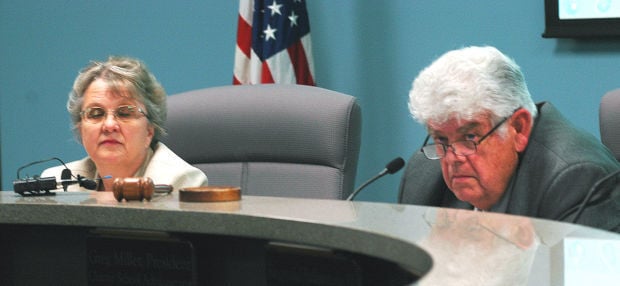PHOENIX — Pressured by Gov. Doug Ducey, the president of the state Board of Education quit Wednesday.
Greg Miller said aides to the governor told him they wanted him out as the top board official. Miller said Ducey, who is due to make new board appointments as early as this week, believed the change would help smooth over what has been at best a rocky relationship between the board and state schools chief Diane Douglas.
Miller, however, said he saw no reason to stay on at all as a rank-and-file member. So he said he agreed to quit if he could control the wording of the press release, the timing of the announcement and got some assurances that the charter school he runs would get “political protections that I no longer could provide.”
“We recently asked him if he was willing to step down as president (of the board) in order to provide fresh leadership,” gubernatorial press aide Daniel Scarpinato confirmed. Miller’s tenure as president — as well as his term on the board — otherwise would have run through Jan. 15.
Scarpinato said his boss concluded the state’s education priorities were not going to get resolved with Miller at the helm of the board and the ongoing friction with Douglas.
“Something that’s critical to that happening is for the board and the department to have a productive relationship in order to achieve the goals that the board has and the superintendent and the governor share,” he said.
Miller, for his part, noted that Douglas, by virtue of being elected, is here to stay, at least through the end of her term that runs through 2018. And he agreed with the governor that something had to give.
“She’s going to be there another two-plus years,” he said.
“So I’m the expendable piece,” Miller said. “She is not.”
Scarpinato said while Ducey wanted Miller out as board president, his decision to leave the board entirely was “one he made on his own, and one we respect.”
The governor has three of his own appointees on the board, though one has to be the president of one of the three state universities, pretty much limiting his choices. He already had three slots to fill; Miller’s resignation gives him a fourth.
Douglas, in he own statement Wednesday about Miller’s resignation, makes no mention of him at all, nor of the more than year-long feud with the board under his direction.
“The superintendent’s focus has been on helping Arizona students since she took office,” said press aide Charles Tack. “That focus has never shifted.”
Douglas, who sits on the board, took a dig of sorts at Miller and the other members with whom she has been at odds since taking office: She reminded people she is “the only elected member of the state Board of Education” while the others are simply gubernatorial appointees.
Miller’s resignation could be the beginning of the end of what has been an ongoing feud between the school superintendent and the Education Board over control over the education agenda in Arizona.
Douglas, elected in 2014, claims she has a mandate from the public to pursue her agenda. That includes ridding the state of the Common Core academic standards.
By contrast the board has not only approved the standards but continued to implement them.
The differences erupted into a pair of lawsuits over control who controls the board’s staff.
That issue was supposed to be resolved with a change in state law approved earlier this year and signed by Ducey.
But Miller said there have been ongoing issues, with Douglas continuing to refuse to provide the board with the staff necessary to do its own work.
Such as?
“Just about everything,” he said. “Every time we try and get something moving, the resources aren’t available.”
Some of the dispute is based in the strong personalities of both Douglas and Miller. But much of it traces its roots to state education laws.
The board is charged with setting the education policy of the state, at least within the confines outlined by the legislature. The governor appoints 10 of the members; the school superintendent is automatically on the board.
By contrast, the superintendent of public instruction runs the day-to-day operations of the Department of Education. And, by law, that person is supposed to “execute, under the direction of the state board of education, the policies that have been decided on by the state board.”
Douglas, however, has claimed that her 2014 election amounts to a mandate by voters to pursue her own policies. That includes the promise to repeal the Common Core standards.
The fight started a month after she took office when she attempted to fire the board’s executive director and assistant, calling them “two liberal staff who have publicly stated they will block all efforts to repeal or change Common Core.” That move fizzled when Ducey told state personnel officials to keep the pair on the payroll.
Ongoing spats eventually led to the board moving its staffers outside of the Department of Education Building.
Douglas responded by filing suit, contending state law gave her control of board employees. And she argued that the board can hire an executive director only on her recommendation.
A trial judge sidestepped the question, calling it a political dispute.
Separately, the board sued Douglas after she refused to give its investigators remote computer access to teacher files. Douglas argued if the investigators want the files — necessary to doing their job of background checks and looking into allegations of teacher misconduct — they would have to come to her building where she said they belong in the first place.
The lawsuits were withdrawn earlier this year after Sen. Jeff Dial, R-Chandler, brokered a deal to revamp state law.
It now spells out that the Education Board and not the state schools chief has sole authority to hire, fire and control its own employees. In return, the board gave up control of the investigators.





